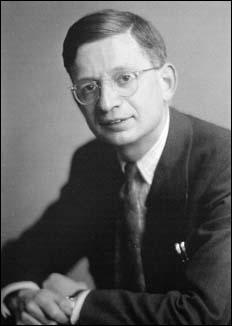On this day on 19th September
On this day in 1486 Elizabeth of York gave birth to a son, Prince Arthur. He therefore became the heir to Henry VII and was baptized on 24th September in Winchester Cathedral. In August 1497, Arthur and Catherine of Aragon were formally betrothed at the ancient palace of Woodstock . On 27th March 1502, Arthur fell seriously ill. Based on the description of symptoms by his servants, he appeared to have been suffering from a bronchial or pulmonary condition, such as pneumonia, tuberculosis or some virulent form of influenza. He died on Saturday, 2nd April, 1502.
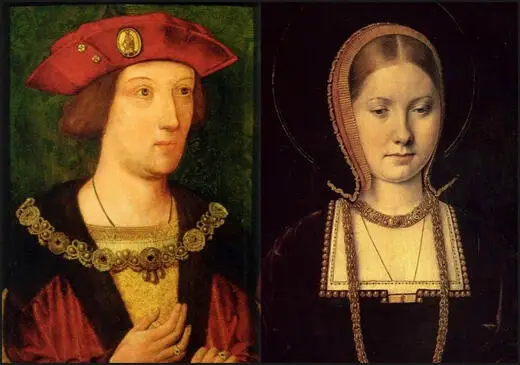
On this day in 1841 Charles Poulett Thomson died. Thomson was a supporter of parliamentary reform, he became Manchester's first Member of Parliament in 1832. Appointed Governor-General of Canada in 1839, he was was created Lord Sydenham in August 1840.
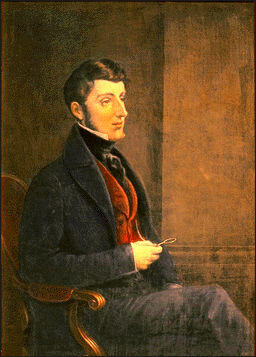
On this day in 1863 General Braxton Bragg and his troops attacked union armies led by George H. Thomas and William Rosecrans at Chickamauga. Thomas was able to hold firm but Rosecrans and his men fled to Chattanooga. Bragg followed and was attempting to starve Rosecrans out when union forces led by Ulysses S. Grant, Joseph Hooker and William Sherman arrived. Bragg was now forced to retreat and did not stop until he reached Dalton, Georgia.
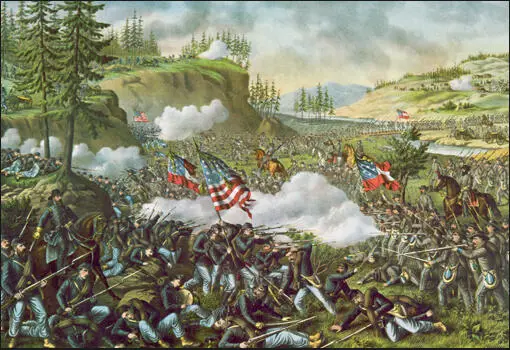
On this day in 1893 New Zealand becomes the first country to grant all women the right to vote. This gives encouragement to those in the UK who have been fighting for many years for women's suffrage.
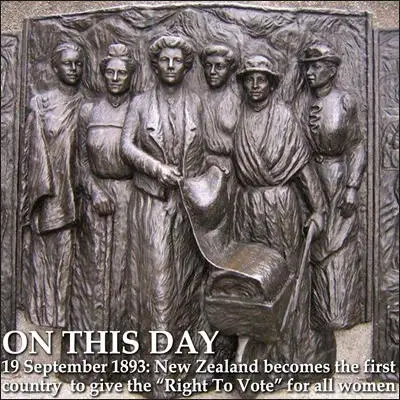
On this day in 1900 the Wild Bunch (Butch Cassidy, Sundance Kid, William Carver, Ben Kilpatrick and Henry Logan, held up the San Miguel Valley Bank that netted $32,640. The name Wild Bunch was misleading as Cassidy always tried to avoid his gang hurting people during robberies. His gang were also ordered to shoot at the horses, rather than the riders, when being pursued by posses. Cassidy always proudly boasted that he had never killed a man. The name actually came from the boisterous way they spent their money after a successful robbery.
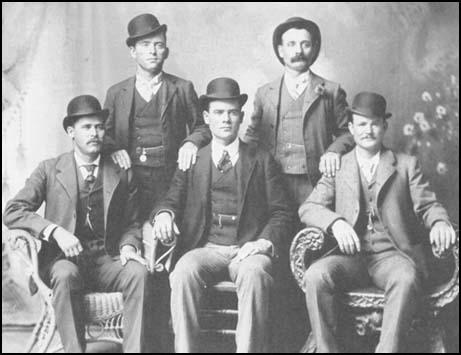
Ben Kilpatrick, Henry Logan and Robert Parker (Butch Cassidy)
On this day in 1909 Ferdinand Ferber was killed when he crashed his plane at Boulogne. In 1899 Ferber began producing gliders. He continued to experiment and in 1904 Ferber built a biplane glider with a fixed tail. This was an important innovation and solved most of the problems associated with glider flight.
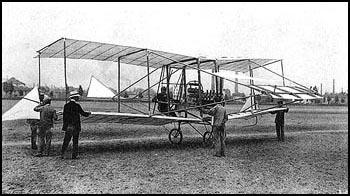
On this day in 1923 Ernst Toller had his play "Hinkemann," premiered in Leipzig. Toller, a refugee from Nazi Germany committed suicide on 22nd May 1939. According to the The New York Times: "Ernst Toller, exiled German writer and lecturer, committed suicide yesterday, hanging himself by a bathrobe cord in his apartment in the Mayflower Hotel, Sixty-first Street and Central Park West. He was 46 years old.... Friends said he had undertaken no new writing but was casting about for further material. They attributed much of his depression to the gloomy view he had to take recently of events in Europe and the threat that he saw in the extension of totalitarianism to the American continent."
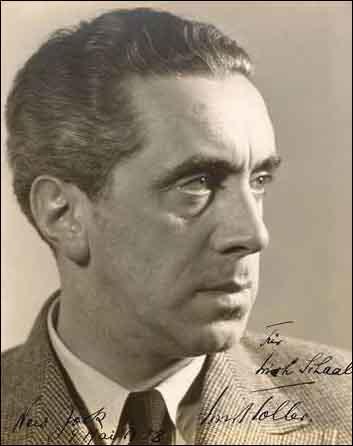
On this day in 1931 Geli Raubal was found on the floor of her room in the flat, by Georg Winter, the husband of Hitler's housekeeper. In a statement later given to the police he explained what had happened that morning: "As the thing seemed to me rather suspicious, at ten o'clock I forced the double-door open with a screwdriver... As I'd opened the door I stepped into the room and found Raubal lying on the floor as a corpse. She'd shot herself. I can't give any reason why she should have shot herself."
It was later revealed that the previous evening, Adolf Hitler left for Hamburg as part of his electioneering in North Germany. It was alleged that they had quarrelled before his departure. Angela Raubal, Geli's mother, later said she wanted to marry a violinist from Linz, but she and her half-brother had forbidden her to see the man. Cate Haste has suggested she may have been pregnant by a Jewish lover in Vienna.
A meeting was held by leading officials in the Nazi Party before the police were called. This included Franz Schwarz, Gregor Strasser, Baldur von Schirach, Max Amann and Rudolf Hess. They discussed what they should do before the police were brought to Hitler's apartment: "We know that a top-level conference of Munich Nazis was held in his flat during the morning of Saturday, 19 September, though we do not know what time it began or who convened it.... Eventually Schirach telephoned Adolf Dresler of the press department at the Brown House, instructing him to tell the press that Hitler had gone into deep mourning after his niece's suicide. But they went on arguing about whether this was the best line to take, and they decided it was not. Schirach made another call to Dresler, telling him to say it had been an accident."
The Münchener Neueste Nachrichten reported the following day. "According to a police communique, a twenty-three-year-old student fired a pistol aimed at the heart in a room of her flat in the Bogenhausen district. The unfortunate young woman, Angela Raubal, was the daughter of Adolf Hitler's half-sister, and she and her uncle lived on the same floor of a block of flats on Prinzregentenplatz. On Friday afternoon the owners of the flat heard a cry but it did not occur to them that it came from their tenant's room. When there was no sign of life from this room in the course of the evening, the door was forced. Angela Raubal was found lying face down on the floor, dead. Near her on the sofa was a small-calibre Walther pistol."
The Münchener Post carried a story that suggested that the newspaper was relying on inside information. "On Friday 18 September there was once again a violent quarrel between Herr Hitler and his niece. What was the reason? The vivacious 23-year-old music student, Geli, wanted to go to Vienna, she wanted to become engaged. Hitler was strongly opposed to this. The two of them had recurrent disagreements about it. After a violent scene, Hitler left his flat on the second floor of 16 Prinzregentenplatz... The dead woman's nose was broken, and there were other serious injuries on the body. From a letter to a female friend living in Vienna, it is clear that Fraulein Geli had the firm intention of going to Vienna. The letter was never posted."
The unfinished letter was not a suicide note. It was addressed to someone in Vienna. The police report said that it was to a girlfriend but Baldur von Schirach has claimed it was to her music teacher. The tone was cheerful, and the letter broke off in the middle of the sentence: "When I come to Vienna - I hope very soon - we'll drive together to Semmering an...". (Semmering is an attractive health resort outside Vienna.) Some historians have suggested that it was highly unlikely that someone would start a letter arranging a future holiday before committing suicide.
Adolf Hitler reacted strongly against this news report. He issued a statement: "(1) It is untrue that I had either 'recurrent disagreements' or 'a violent quarrel' with my niece Angela Raubal on Friday 18 September or previously. (2) It is untrue that I was 'strongly opposed' to my niece's travelling to Vienna. The truth is that I was never against the trip my niece had planned to Vienna. (3) It is untrue that my niece wanted to become engaged in Vienna or that I had some objection to my niece's engagement. The truth is that my niece, tortured by anxiety about whether she really had the talent necessary for a public appearance, wanted to go to Vienna in order to have a new assessment of her voice by a qualified voice specialist. (4) It is untrue that I left my flat on 18 September 1931 'after a violent scene'. The truth is that there was no kind of scene and no agitation of any kind when I left my flat on that day."
Dr. Muller, the police doctor who signed the death certificate dismissed the idea that Geli Raubal had been beaten up before the suicide. "On the face and especially on the nose were to be found no wounds connected with the bleeding of any kind. Nothing was to be found on the face except dark greyish death-marks which had proceeded from the fact that Raubal expired with her face to the floor and remained in that position for about 17-18 hours. That the tip of the nose was pressed slightly flat is due entirely to her lying with her face on the floor for several hours. The extreme discoloration of the death-marks in the face is probably to be explained by the fact that death was primarily consequent on suffocation following the shot in the lung."
According to the police report, Geli Raubal had been bleeding from a wound near her heart and her clothes were soaked with blood. She was lying face downwards, with her nose against the floor. One arm was stretched out towards the pistol, a Walther 6.35, which was on the couch. The bullet, which had missed her heart, had pierced her lung. Still in her body, it had lodged on the left side of her back above the level of her hip. Ronald Hayman has pointed out: "This means that if she was standing or sitting when the shot was fired, the barrel of the pistol was pointing downwards, and the hand holding it was higher than her heart. Even if she was lying on the couch or the floor, it would not have been easy for her to shoot herself in this way. And why should she want to? Having been taught how to use a Walther, she could, if she wanted to kill herself, easily have avoided such a slow and painful death."
Unfortunately, there was no inquest, and only one doctor examined her body before it was released, taken out of the country. One of the advantages of having the body taken across the frontier was that this would rule out any possibility of exhuming her for an inquest. Franz Gürtner, the Minister of Justice in Bavaria, was in a good position to cover up if she had been murdered. He held extreme right wing views and protected the Nazis during this period. According to Heinrich Hoffmann, it was her mother, Angela Raubaul, who decided that her daughter should be buried in Vienna.
Geli Raubal was given a Catholic funeral when she was buried at the Zentralfriedhof Cemetery on 23rd September, 1931. Of course, people who had committed suicide were not allowed to have a Catholic funeral. Father Johann Pant, who conducted the service, later said that he could not have done what he did if Geli had died by her own hand. Pant, who had known Hitler for over twenty years, was obviously convinced that Geli had been murdered. He later fled Nazi Germany and went to live in Paris. In 1939 he wrote to the Courier d'Autriche newspaper and claimed: "They pretended that she committed suicide; I should never have allowed a suicide to be buried in consecrated ground. From the fact that I gave her Christian burial you can draw conclusions which I cannot communicate to you."
Angela Raubal, later claimed: "I can't understand why she did it. Perhaps it was an accident, and Geli killed herself while she was playing with the pistol which she got from him (Hitler)." Otto Wagener, who worked for Hitler, believes the death was an accident: "The bullet's trajectory showed that she had the pistol in her left hand with the barrel towards her body. Since she was sitting at her desk and writing a totally innocent letter which was unfinished, we must assume that it came into her head to fetch the pistol and check whether it was loaded, at which point it went off and hit her in the heart - an unfortunate accident."
Ian Kershaw also believes it was an accident: "Hitler's political enemies had a field day. There were no holds barred on the newspaper reports. Stories of violent rows and physical mistreatment mingled with sexual innuendo and even the allegation that Hitler had either killed Geli himself or had had her murdered to prevent scandal. Hitler himself was not in Munich when his niece died. And it is not easy to see the reasoning for a commissioned murder to prevent a scandal being carried out in his own flat. As it was, the scandal was enormous."
Rudolf Hess believed that Geli Raubal had been killed by a jealous woman who got into the flat during the night. The anti-Nazi journalist, Konrad Heiden, has argued that Geli was pregnant by a Jewish man and that just before her death she was visited by Heinrich Himmler. He told her that she had "betrayed the man who was her guardian, her lover and her Führer in one - according to National Socialist conceptions there was only one way of making good such a betrayal." Heiden points out that the man who told him this story, Father Bernhard Stempfle, was murdered on the orders of Hitler on 30th June, 1934.
Six years after Geli's death Bridget Hitler visited Ernst Hanfstaengel, who was then living in London. Bridget told Hanfstaengel that she was convinced that it was suicide rather than murder. She claimed that "the immediate family knew very well that the cause of Geli's suicide was the fact that she was pregnant by a young Jewish art teacher in Linz, whom she had met in 1928 and wanted to marry at the time of her death."
Henriette Hoffmann, her closest friend, believed that Geli had killed herself: "He (Hitler) fenced her life so tightly, confined her in such a narrow space that she saw no other way out. Finally she hated her uncle, she really wanted to kill him. She couldn't do that. So she killed herself, to hurt him deeply enough, to disturb him. She knew that nothing else would wound him so badly. And because he knew too, he was so desperate, he had to blame himself."
Rudolf Hess claimed that Hitler became suicidal because of the rumours that he had shot Geli Raubal. "He was so fearfully vilified by this new campaign of lies that he wanted to make an end of everything. He could no longer look at a newspaper because this frightful filth was killing him. He wanted to give up politics and never again appear in public."
One consequence of Geli's suicide was that Hitler became a vegetarian. He claimed that meat now reminded him of Geli's corpse. Alan Bullock, the author of Hitler: A Study in Tyranny (1962) has argued that Geli's death dealt him "a greater blow than any other event in his life. For days he was inconsolable and his friends feared he would take his own life... For the rest of his life he never spoke of Geli without tears coming to his eyes; according to his own statement to a number of witnesses, she was the only woman he ever loved."
Ernst Hanfstaengel wrote in The Missing Years (1957): "I am sure that the death of Geli Raubal marked a turning point in the development of Hitler's character. This relationship, whatever form it took in their intimacy, had provided him for the first time in his life with a release to his nervous energy which only too soon was to find its final expression in ruthlessness and savagery. His long connection with Eva Braun never produced the moon-calf interludes he had enjoyed with Geli and which might in due course, perhaps, have made a normal man out of him. With her death the way was clear for his final development into a demon, with his sex life deteriorating again into a sort of bisexual narcissus-like vanity, with Eva Braun little more than a vague domestic adjunct."
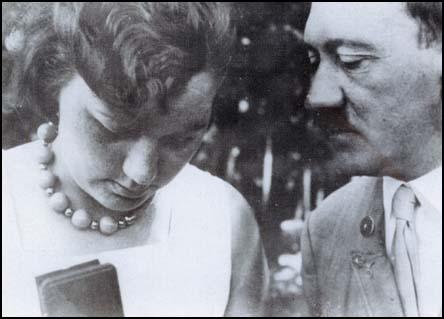
On this day in 1934 Bruno Hauptmann was arrested for kidnapping and killing Charles Lindbergh Jr., son of aviator Charles Lindbergh. Hauptmann, a German-born carpenter, was executed for the crime on 3rd April, 1936. Lindbergh and his wife were devastated by this event and decided to move to Europe in December 1935 in order to "seek a safe, secluded residence away from the tremendous public hysteria".
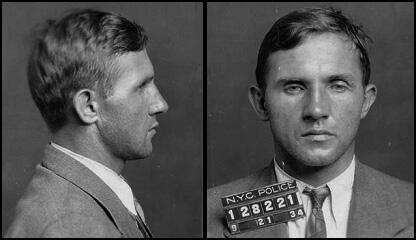
On this day in 1939 British Expeditionary Force reaches France. The BEF took up defensive positions along the Franco-Belgian frontier. Under the command of General John Gort, the force included four regular infantry divisions and 50 light tanks.
By May 1940, one more regular and five more divisions from the Territorial Army had arrived. There were now 394,165 men in France with 237,319 assigned to front-line service. Tank strength had grown to a two-battalion infantry tank brigade (100 tanks) and two cavalry light tank brigades (200 tanks).
General Fedor von Bock and Army Group B attacked the BEF on 14th May, 1940. As Bock's men pushed the Allied forces back towards the French frontier, General Gerd von Rundstedt and Army Group A invaded France through the Ardennes. Rundstedt's offensive cut communications between French and British commands and left the BEF surrounded on three sides.
General John Gort attempted to halt the German Western Offensive by launching a counter-attack against the German Army at Arras. The attack on 21st May, 1940, could not be sustained and Gort decided to withdraw to Dunkirk so that his army could be evacuated to Britain.
Between 27th May and 4th June, 1940, a total of 693 ships (39 Destroyers, 36 Minesweepers, 77 trawlers, 26 Yachts and a variety of other small craft) brought back 338,226 people back to Britain. Most of these were members of the British Expeditionary Army but it also included 40,000 were members of the French Army. All the tanks and large guns had to be abandoned and left in France.
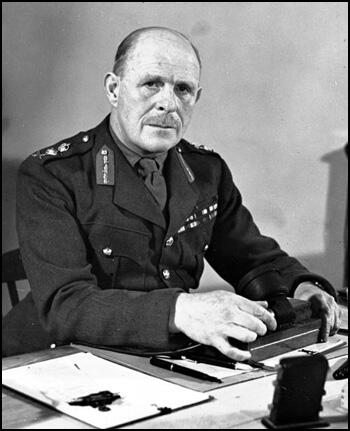
On this day in 1940 Witold Pilecki is voluntarily captured and sent to Auschwitz in order to smuggle out information and start a resistance. In 1942 Pilecki discovered that new windowless concrete huts were being built with nozzles in their ceilings. Soon afterwards he heard that that prisoners were being herded into these huts and that the nozzles were being used to feed cyanide gas into the building. Afterwards the bodies were taken to the building next door where they were cremated. Pilecki got this information to the Tajna Armia Polska who passed it onto the British foreign office. This information was then passed on to the governments of other Allied countries. However, most people who saw the reports refused to believe them and dismissed the stories as attempts by the Poles to manipulate the military strategy of the Allies.
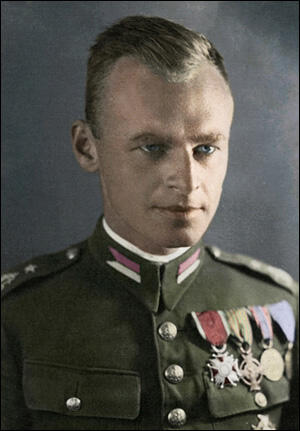
On this day in 1941 the first meeting of partisan leaders Josip Broz (Tito) and Draza Mihailovic took place in Yugoslavia. The Allies provided military aid to Tito and Mihailovic. However, Mihailovic was a traditional monarchist whereas Tito was a communist and it was not long before the two armies were fighting each other.
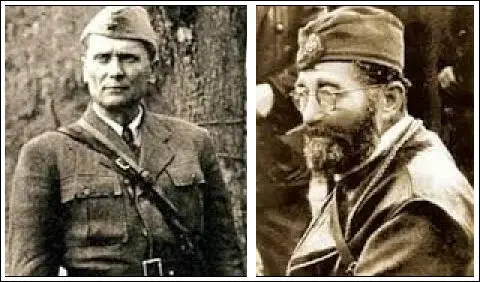
On this day in 1941 the German Army captured Kiev in the Soviet Union as part of Operation Barbarossa. General Walter Warlimont issued an order to all military commanders in the German Army about the occupation of the Soviet Union: (i) Political officials and leaders are to be liquidated. (ii) Insofar as they are captured by the troops, an officer with authority to impose disciplinary punishment decides whether the given individual must be liquidated. For such a decision the fact suffices that he is a political official. (iii) Political leaders in the troops (Red Army) are not recognized as prisoners of war and are to be liquidated at the latest in the prisoner-of-war transit camps.
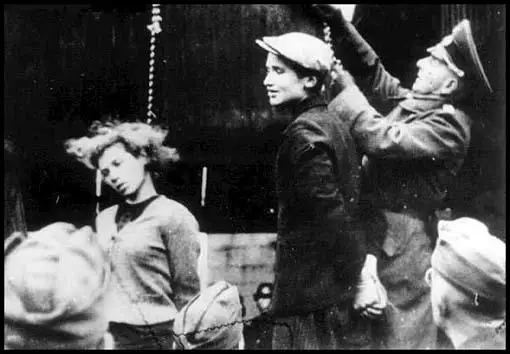
On this day in 1941 Nazi government forced German Jews, and over to wear Jewish stars. By the end of 1941 over 500,000 Jews in Poland and Russia had been killed by the Schutz Staffeinel (SS). At the Wannsee Conference held in January 1942, Reinhard Heydrich, Heinrich Muller, Adolf Eichmann and Roland Friesler discussed what became known as the Final Solution. It was eventually decided to make the extermination of the Jews a systematically organized operation. After this date extermination camps were established in the east that had the capacity to kill large numbers including Belzec (15,000 a day), Sobibor (20,000), Treblinka (25,000) and Majdanek (25,000).
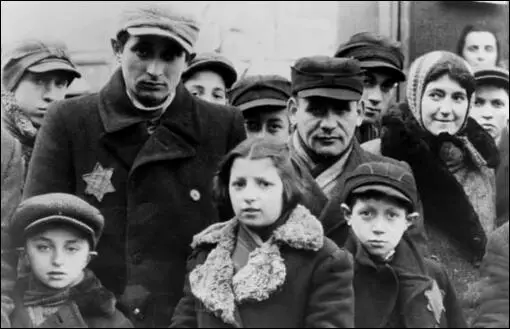
On this day in 1943 Alexander Petrovich Apsit died. A talented artist after the Bolshevik Revolution in 1917 Apsit was commissioned by the State Publishing House to design revolutionary posters. The Year of Proletarian Dictatorship was produced in October, 1918, for the first anniversary of the revolution. It shows the key elements of the revolutionary poster's imagery: a farmer with a red flag and scythe in the foreground, and a blacksmith with a hammer crushing the emblems of fallen capitalism - both as guards in front of a field of simple flags in the background an industrialized city and a rising sun.
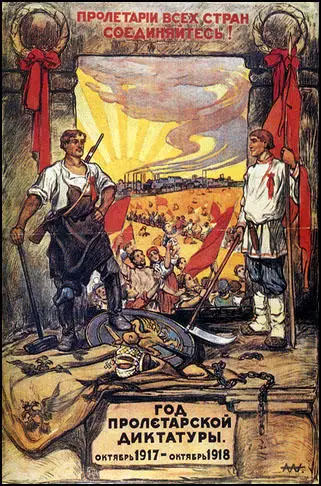
On this day in 1944 Guy Gibson flew his De Havilland Mosquito as master bomber in a raid on Rheydt. He never arrived home and later it was discovered that Gibson and his navigator, James Warwick, had been killed when the plane crashed in the Netherlands. Gibson was awarded the Victoria Cross after being the Commanding Officer of No. 617 Squadron, which he led in the Dam Busters raid in 1943, resulting in the breaching of two large dams in the Ruhr area of Germany.
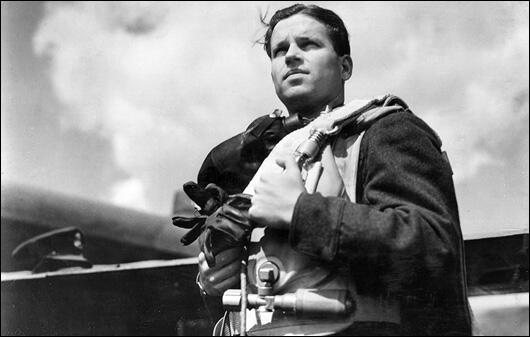
On this day in 1945 Lord Haw Haw (William Joyce) sentenced to death in London. In court it was stated that although he was United States citizen he had held a British passport during the early stages of the war. It was therefore argued by Hartley Shawcross that Joyce had committed treason by broadcasting for Germany between September 1939 and July 1940, when he officially became a German citizen. William Joyce was executed on 3rd January 1946.
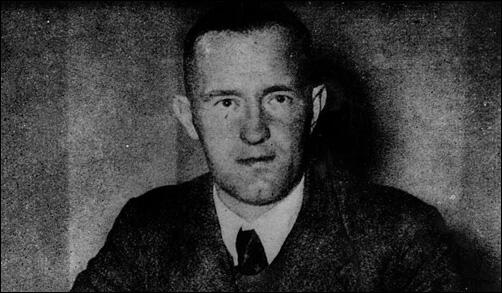
On this day in 1952 the United States stopped Charlie Chaplin from re-entering the country after a trip to England. Chaplin, a prominent anti-fascist pointed out in his autobiography: "My prodigious sin was, and still is, being a non-conformist. Although I am not a Communist I refused to fall in line by hating them."
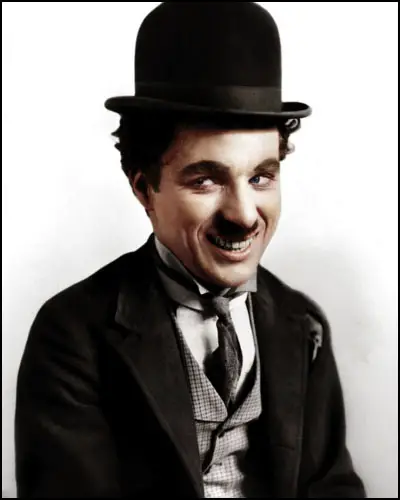
On this day in 1957 George Whitelaw died. He was a successful cartoonist who worked for Punch Magazine and the The Daily Herald.
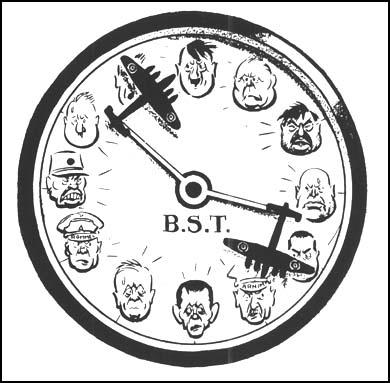
On this day in 1995 Rudolph Peierls died in Oxford. A Jewish nuclear physicist working in Nazi Germany he fled to England in 1934. In 1940 Peierls wrote a paper that explained how a uranium fission bomb could become a weapon that could win the Second World War. In 1943 Peierls joined the Manhattan Project. In the United States. Over the next two years he worked with Robert Oppenheimer, Edward Teller, Otto Frisch, Felix Bloch, Enrico Fermi, David Bohm, James Chadwick, James Franck, Emilio Segre, Eugene Wigner, Leo Szilard and Klaus Fuchs in developing the atom bombs dropped on Hiroshima and Nagasaki.
